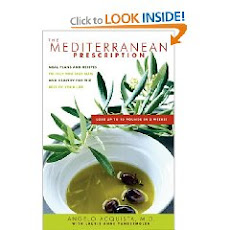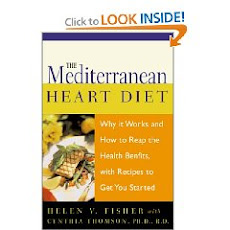Cholesterol: Mediterranean Diet Safer and More Effective than Statins?
This article looks at statin drugs and some of the possible side effects. Are they worth the risk when diet offers a better option?
Researchers from Tufts Medical Center and the University of Bern recently published in the Canadian Medical Association Journal the results of a study that indicate cholesterol-lowering statin drugs may cause serious, long-term muscle damage that persists even after the drugs are halted.
It has been known for some time that weakness and aches in the muscles - known as myalgia - can occur in 10% to15% people taking statins and that more severe and persistent pain known as myopathy occurs in roughly 2 percent.
This writer can vouch that just two days into taking the statins I had been prescribed, I experienced the most dreadful muscle weakness and had to stop taking them. I switched instead to a handling using diet and became over the ensuing months as fit as a fiddle as a result. I recall thinking at the time that if these drugs are doing this after two days, what are they going to do to me after two years of taking them?
In the aforementioned study, the researchers carried out muscle biopsies on a total of 83 patients. Of that 83, 44 were or had recently been taking statins and were also suffering from myopathy so severe as to interfere with their daily activities. Out of that 44, 29 were currently taking statins, while the remaining 15 had been using them but had discontinued taking them at least three weeks earlier.
Another 19 of the total of 83 people that participated in the study were taking statins but not suffering from myopathy, while the final 20 had never experienced myopathy and never taken statins.
Researchers found signs of muscle damage in 25 of the myopathy patients, including the majority of those who had already stopped taking statins.
Researchers do not know why statin use can lead to myopathy in some patients, although they do know that certain factors may raise that risk. Such factors include high doses of the statin drugs, old age, vigorous exercise or taking certain other drugs along with the statins, and these include some cancer drugs and antibiotics.
However that may be, this association of statins with muscle weakness cannot but be cause for concern because the heart is also a muscle!
Cholesterol is made in the liver and statins work to lower cholesterol by blocking the chemical pathway in the liver that makes it. But that same pathway also makes something called co-enzyme Q10 (CoQ10). CoQ10 is key to the process of making energy in all the major muscles - including the heart. The heart evidently uses a big amount of CoQ10 and there is a correlation between the severity of heart failures in people who have the lowest CoQ10 levels.
This reduction of CoQ10 levels, then, may well be the cause of the muscle weakness. The other functions of CoQ10 (such as the stabilization of cell membranes) may be behind other Adverse Drug Reactions (ADR) reported for statins, such as gastrointestinal upsets, liver problems, cataracts, loss of memory and peripheral nerve damage.
Thus, if you are on statins, one way you can help yourself is to supplement CoQ10 – discuss this with a qualified nutritionist. Most doctors will not be useful as so few of them appear to know much about nutrition - bizarre as that may sound!
However, you may want to know how the taking of statins compares with a dietary approach to bringing down cholesterol levels.
A study published in 2002 compared the results obtained on patients taking statins with patients put on a so-called "Mediterranean diet." After four years, those on the Mediterranean diet showed a 70 percent lowered incidence of heart disease, which was three times better than the reduction achieved in the group taking statins.
In 2005 another study involved 74 000 people and using a points system for how much fish, grains and so forth they were eating. The study found that for every 2 points they got closer to the perfect Mediterranean diet, their chances of dying within a periods set by the trial went down by 8% and people on the full diet cut their chances of dying during that set period by an impressive 40%.
If you want to keep your heart healthy, then, one of the best things you can do is switch to a Mediterranean diet |(fresh fruit, fresh vegetables, fish, beans, seeds, nuts, olive oil and dairy products such as yogurt in modest amounts.)
Alongside this I recommend you supplement Wild Blue-Green Algae and drink plenty of water and about four or five cups of green tea a day, instead of coffee. For more information about wild blue-green algae and green tea, read my free e-books on these subjects- available via the Freedom Plaza home page.
There is an awful lot one can do without having to take drugs and suffer their side effects, although if there is a serious cholesterol/heart problem or you have any doubts, make sure you undertake a program to correct the problem under the guidance of a very competent nutritionist or a medical doctor who understands nutrition.
It has been known for some time that weakness and aches in the muscles - known as myalgia - can occur in 10% to15% people taking statins and that more severe and persistent pain known as myopathy occurs in roughly 2 percent.
This writer can vouch that just two days into taking the statins I had been prescribed, I experienced the most dreadful muscle weakness and had to stop taking them. I switched instead to a handling using diet and became over the ensuing months as fit as a fiddle as a result. I recall thinking at the time that if these drugs are doing this after two days, what are they going to do to me after two years of taking them?
In the aforementioned study, the researchers carried out muscle biopsies on a total of 83 patients. Of that 83, 44 were or had recently been taking statins and were also suffering from myopathy so severe as to interfere with their daily activities. Out of that 44, 29 were currently taking statins, while the remaining 15 had been using them but had discontinued taking them at least three weeks earlier.
Another 19 of the total of 83 people that participated in the study were taking statins but not suffering from myopathy, while the final 20 had never experienced myopathy and never taken statins.
Researchers found signs of muscle damage in 25 of the myopathy patients, including the majority of those who had already stopped taking statins.
Researchers do not know why statin use can lead to myopathy in some patients, although they do know that certain factors may raise that risk. Such factors include high doses of the statin drugs, old age, vigorous exercise or taking certain other drugs along with the statins, and these include some cancer drugs and antibiotics.
However that may be, this association of statins with muscle weakness cannot but be cause for concern because the heart is also a muscle!
Cholesterol is made in the liver and statins work to lower cholesterol by blocking the chemical pathway in the liver that makes it. But that same pathway also makes something called co-enzyme Q10 (CoQ10). CoQ10 is key to the process of making energy in all the major muscles - including the heart. The heart evidently uses a big amount of CoQ10 and there is a correlation between the severity of heart failures in people who have the lowest CoQ10 levels.
This reduction of CoQ10 levels, then, may well be the cause of the muscle weakness. The other functions of CoQ10 (such as the stabilization of cell membranes) may be behind other Adverse Drug Reactions (ADR) reported for statins, such as gastrointestinal upsets, liver problems, cataracts, loss of memory and peripheral nerve damage.
Thus, if you are on statins, one way you can help yourself is to supplement CoQ10 – discuss this with a qualified nutritionist. Most doctors will not be useful as so few of them appear to know much about nutrition - bizarre as that may sound!
However, you may want to know how the taking of statins compares with a dietary approach to bringing down cholesterol levels.
A study published in 2002 compared the results obtained on patients taking statins with patients put on a so-called "Mediterranean diet." After four years, those on the Mediterranean diet showed a 70 percent lowered incidence of heart disease, which was three times better than the reduction achieved in the group taking statins.
In 2005 another study involved 74 000 people and using a points system for how much fish, grains and so forth they were eating. The study found that for every 2 points they got closer to the perfect Mediterranean diet, their chances of dying within a periods set by the trial went down by 8% and people on the full diet cut their chances of dying during that set period by an impressive 40%.
If you want to keep your heart healthy, then, one of the best things you can do is switch to a Mediterranean diet |(fresh fruit, fresh vegetables, fish, beans, seeds, nuts, olive oil and dairy products such as yogurt in modest amounts.)
Alongside this I recommend you supplement Wild Blue-Green Algae and drink plenty of water and about four or five cups of green tea a day, instead of coffee. For more information about wild blue-green algae and green tea, read my free e-books on these subjects- available via the Freedom Plaza home page.
There is an awful lot one can do without having to take drugs and suffer their side effects, although if there is a serious cholesterol/heart problem or you have any doubts, make sure you undertake a program to correct the problem under the guidance of a very competent nutritionist or a medical doctor who understands nutrition.

